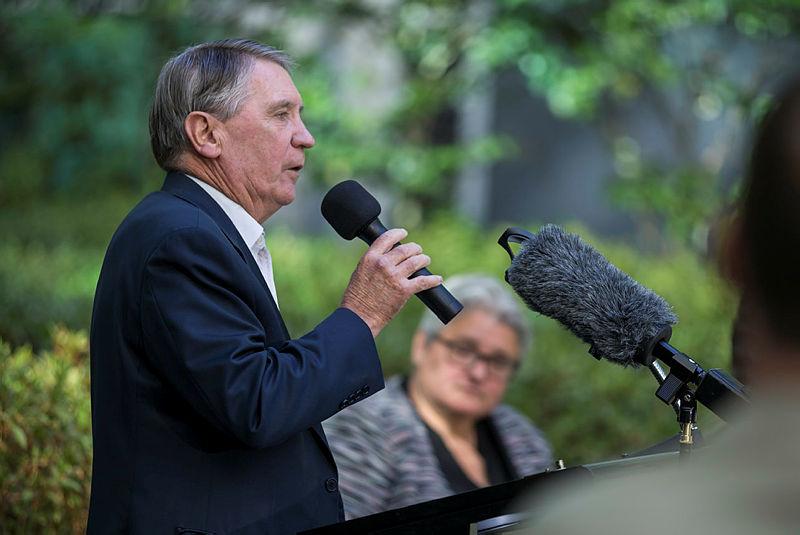
My previous column compared the only Australian mandarins who have headed both Foreign Affairs and Defence, Dennis Richardson and Arthur Tange. To further pursue that comparison, step forward two other mandarins: Philip Flood, former Secretary of DFAT, and Max Moore-Wilton, former Secretary of the Prime Minister’s Department.
In in his memoir, Flood describes Tange as ‘one of the truly great mandarins’ who held the rank of departmental Secretary for 25 years. Flood writes that Tange was driven by his ‘passion for Australia, his powerful work ethic and his strong belief in a distinctive, forceful and uniquely Australian foreign policy. Tange was a serious man with no time for fripperies’.
Flood told me recently that he would nominate Tange as one of Australia’s three greatest public servants of the 20th century, along with Robert Garrran and Roland Wilson. In the contemporary section of Flood’s Public Service Parthenon, Dennis Richardson is rated as one of the three top public servants of recent decades, alongside Max Moore-Wilton and Ken Henry.
Flood makes the point that evaluating Tange and Richardson is deeply problematic because of the way Canberra has changed:
The era of Tange/Wilson/Garran is not comparable with that of Richardson/Henry/Moore-Wilton. The times are so different and, among other factors, now there is no such person as a ‘Permanent Head’. For some time Secretaries have not been ‘exclusive’—they must be ‘inclusive’ and far more responsive to their staff. Post-1990 the Tange/Wilson/Garran models would not have worked.
I contacted Max Moore-Wilton for his assessment and he, too, ranked Richardson as ‘an outstanding public servant, one of the great public servants of his generation.’ An element of the Richardson style that would have attracted Stephen Smith is his willingness to force through a ministerial decision even if he has just as forcefully opposed it. Moore-Wilton said Richardson is robust in his argument but equally as strong in carrying out decisions: ‘Dennis did what was expected of him, whether he totally agreed with it or not.’
For Max Moore-Wilton, Tange and Richardson come from different eras but also brought different characteristics to their service:
I remember Arthur Tange from my time as a young public servant. Dennis Richardson is not another Arthur Tange—they are entirely different characters. Tange was an elitest of the old school. Richardson is much more modern. He has strong opinions but he is much more socially inclusive, not exclusive. Tange was exclusive, very much of the club: he mixed with a layer, and only the top layer. Richardson is much more open to the people who work for him. He is strong minded but he is representative of the best part of the public service, especially in the need to be rigorous in thinking.
The Moore-Wilton view of Tange is coloured by his distaste for Tange’s creation of the military–civilian diarchy at the head of Defence: the division of the management of Defence, under the Minister, between the Chief of the Defence Force and the civilian Secretary. ‘I’m no fan of the diarchy,’ Moore-Wilton said. ‘It has diffused decision-making to a series of joint-committee type structures. It’s strange for a man who was as strong in personality as Tange to produce a structure like the diarchy.’
And that leads to the thought that perhaps Richardson is the man who could tackle Tange’s remaking of Defence in the 1970s, what Peter Edwards in his biography of Tange calls, ‘the greatest peacetime reform in Australian defence organisation in the 20th Century’. Max Moore-Wilton reflects: ‘No politician has been strong enough to manage to change the diarchy. Richardson might have the ability to change things’.
If Dennis Richardson can re-do Tange’s diarchy, he really will rank as one of the great mandarins.
POSTCRIPT: Many moons ago, when I sometimes talked to the military about media-defence relations (talked, I stress, not taught), I contended that it helped to see Tange as akin to a feudal lord. Peter Edwards used my yarn as one illustration in his chapter on Tange as ‘The mandarin unchallenged’.
The feudal reflection summoned a vanished epoch when Secretaries were permanent as well as eminent. Today’s mandarins are equally eminent, but they serve at the Minister’s pleasure. The Paul Barratt sword hangs above every Secretary’s head—the court-established right of a Defence Minister to dismiss a Secretary on almost any pretext (poor ties, bad haircut?).
No such problem for Tange in my depiction of him as the chancellor of a medieval kingdom, in which the king and the princes (the Prime Minister and his ministers) were too often away partying and touring far estates. The civil servants were to be seen as the peasants working the fields and the servicemen were the beasts of burden. And in this Tange hierarchy, the journalists were to be seen as the ticks and fleas that afflicted everyone, from the king to the peasants and the livestock.
Graeme Dobell is the ASPI journalism fellow. Image courtesy of Department of Defence.